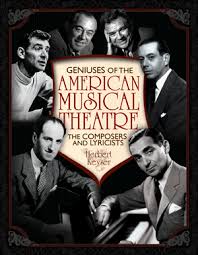 Geniuses of the American Musical Theatre: The Composers and Lyricists
Geniuses of the American Musical Theatre: The Composers and Lyricists
by Herbert Keyser
Applause Books. 305 pages. $29.99
ONE THING that becomes entirely clear as you read Herbert Keyser’s latest book, Geniuses of the American Musical Theatre: The Composers and Lyricists, is that the author is a font of knowledge about song on stage. As his bio tells us, the book is based on the lectures Keyser delivers to passengers on cruise ships. Even if the author is conspicuously heterosexual (his bio lists a loving wife, six children, and ten grandchildren), there’s something innately gay about a book on the topic of musical theatre.
This is a well-assembled, quite beautiful book. Its expansive size means it can double as a coffee-table book, and it’s one that many musical theatre queens will want in their libraries. Keyser includes the requisite number of factoids, including lists of shows produced, to make the book an important reference for students and for theatre and film buffs alike. Naturally, I was first drawn to the chapters on gay composers. Perhaps most poignant is Leonard Bernstein’s life story, given that he was clearly so tortured by his personal demons as a gay man living in a brutally homophobic time. Keyser recounts the final, grueling years, when Bernstein fell in love with a man who would later contract AIDS. While reading these details, you wonder: did the man who brought us West Side Story and Trouble in Tahiti, among many others, deserve this? Friends recall his worsening public behavior as he apparently fell apart. The chapter on Cole Porter is also quite sad, given that he remained in what was probably a marriage of convenience for years and carried on with men on the side, with his wife protesting if his same-sex liaisons became too public.
A strange feeling kicks in as you read over these passages. What’s most amazing is the way in which people like Porter, who, while suffering through a great deal of personal agony, wrote beautiful, witty, and intensely romantic songs—arguably some of the most romantic songs of the 20th century. Consider that “It’s De-Lovely,” “In the Still of the Night,” “Anything Goes,” and “My Heart Belongs to Daddy” are all part of Porter’s body of work. That these composers and lyricists often created these uplifting songs while suffering through such horrific times is testimony to their epic talent.
Ultimately, a gap between style and content emerges in this book. The subject matter is a medley of some of the most colorful artists one can think of, writing and belting out songs in the often otherworldly milieu of the theatre. But Keyser, while a clear and concise writer, avoids the pizzazz that one might expect such material to inspire. Some of his ultra-low-key prose could just as easily be describing a golf tournament. Witness this description of Porter’s eventual dining habits, which came toward the end of his life as he careened into severe depression and an alcoholic haze: “At the meal he would consume large quantities of wine and guests were asked to leave the table while he urinated into a container. The only exception to that would be when he was completely incontinent. … When no guests were available, which was common, because no one wanted to participate in this extremely unpleasant dinner arrangement, his butler would alternate as butler and guest.” But perhaps this no-nonsense style is justified by the fact that the actions of these artists were so often over the top: let their strangeness speak for itself.
________________________________________________________
Matthew Hays is the author of The View From Here (Arsenal Pulp).





